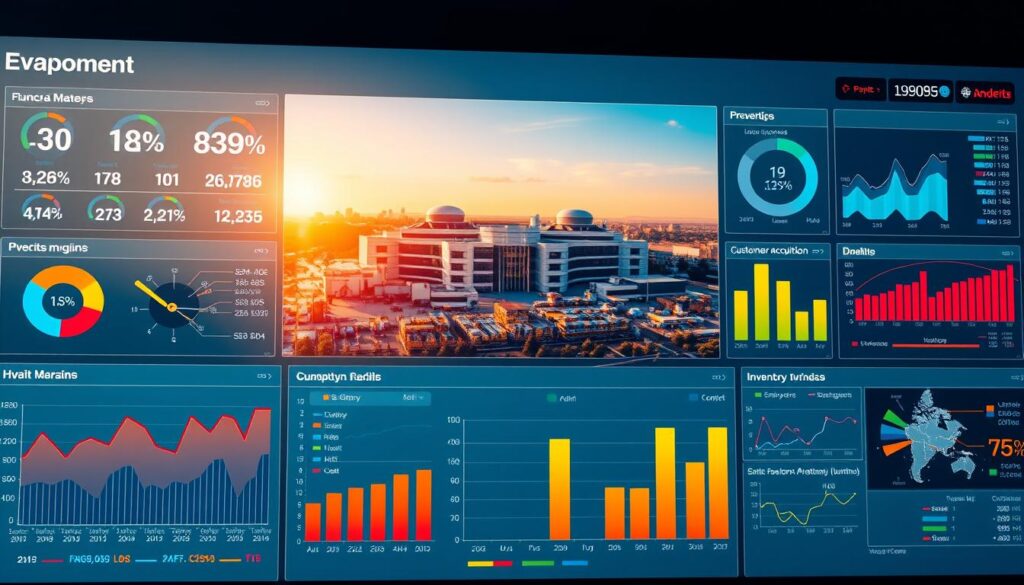Affiliate Disclosure
HVAC Guide Guys is a participant in the Amazon Services LLC Associates Program, an affiliate advertising program designed to provide a means for sites to earn advertising fees by advertising and linking to Amazon.
How Much Do HVAC Companies Sell For? Ever thought about what your HVAC business could be worth today? The HVAC business world is complex. It’s not just about your yearly earnings.

Figuring out how much HVAC companies sell for takes a deep look at many financial and operational details. Business owners often miss the key factors that affect their company’s value.
This guide will show you the important strategies and metrics that business brokers use. Whether you’re thinking of selling or just want to know your business’s worth, you’ll learn a lot about HVAC business valuation.
Key Takeaways
- HVAC business values depend on multiple financial metrics
- Earnings multipliers are key in figuring out company worth
- How well your business runs greatly affects its value
- Having steady income streams makes your business more appealing
- Your market position and who your customers are also matter a lot
Table of Contents
Understanding HVAC Business Valuation Methods
When you’re thinking about buying an HVAC company, knowing the valuation methods is key. Finding the real value of an HVAC business sale takes more than just numbers. It involves complex financial strategies.
Business owners need to know that valuation is more than just looking at how much money you make. The best methods look deeper into your business’s financial health and growth possibilities.
The Earnings Multiplier Method
This method looks at your business’s profit through important financial signs. It helps buyers see the real value by checking:
- Historical financial performance
- Consistent revenue streams
- Potential for future growth
- Stability of customer base
EBITDA Calculation Basics
EBITDA (Earnings Before Interest, Taxes, Depreciation, and Amortization) gives a clear view of how well your business operates. To calculate it, you need to:
- Find the net income
- Add back interest expenses
- Include tax expenses
- Adjust for depreciation
- Account for amortization
Common Valuation Metrics
Investors and buyers look at HVAC businesses with several financial metrics. Knowing these metrics can really help your negotiation when selling your business.
The goal is to show a complete financial picture that highlights your business’s true value.
Key Factors That Impact HVAC Company Value
When figuring out the price to buy an HVAC firm, many important factors come into play. Knowing these can help you get the best price for your HVAC contractor and make smart choices about its value.
Financial performance is key in valuing a company. Buyers look closely at metrics that show how well your business is doing and how it might do in the future:
- Annual revenue consistency
- Profit margins
- Cash flow stability
- Growth trajectory
Your customer base is also very important. Diverse and loyal customers show a strong business model. Buyers want to see:
- Residential and commercial client mix
- Long-term service contracts
- Repeat business rates
- Geographic market penetration
“The strength of your customer relationships directly impacts your company’s marketability and value.” – HVAC Industry Expert
Your operational setup also plays a big role in the price of an HVAC firm. Investors check your:
- Equipment quality
- Technological capabilities
- Management team expertise
- Competitive positioning
Smart business owners know that getting ready for a sale means always working to improve these important factors.
Explore Our HVAC Shop
Looking for top-rated HVAC tools, parts, and accessories? Visit our shop and find the perfect solution for your needs.
Visit the ShopHow Much Do HVAC Companies Sell For: Price Ranges and Multiples
Understanding the value of your HVAC company is key to planning its future. The worth of an HVAC business changes a lot. It depends on revenue, profit, and its place in the market.
When thinking about selling your HVAC business, remember that valuations vary. Buyers and investors look at more than just how much money you make. They want to know the real value of your business.
Small HVAC Companies ($1-5M Revenue)
Small HVAC businesses usually sell for 3-5 times their annual earnings. The value depends on a few important things:
- Consistent revenue streams
- Stable customer base
- Documented financial performance
Mid-Size Operations ($5-20M Revenue)
Mid-sized HVAC companies draw more serious buyers. They can sell for 5-7 times their earnings. This shows:
- Established market presence
- Diversified service offerings
- Stronger operational systems
Large HVAC Enterprises ($20M+ Revenue)
Large HVAC businesses can get very high valuations, up to 7-10 times earnings. These companies usually have:
- Advanced technological infrastructure
- Multiple geographic markets
- Substantial recurring revenue
Your company’s exact value depends on its unique features. Professional appraisers can give you the best idea of your HVAC business’s worth.
The Role of Recurring Revenue in HVAC Business Value
When figuring out how much HVAC companies sell for, recurring revenue is key. Buyers love stable income that lowers risk and shows steady financial health.
Recurring revenue makes an HVAC company’s price go up. It gives a steady flow of money. Service contracts and maintenance plans are big hits with investors looking at hvac company selling price.
- Maintenance contracts increase business valuation
- Predictable income reduces investment risk
- Long-term service agreements boost market attractiveness
Your HVAC business can boost its value by creating smart recurring revenue plans. These might include:
- Annual maintenance packages
- Preventative service subscriptions
- Extended warranty programs
Investors usually give more value to businesses with strong recurring revenue. A good service plan can raise the sale price by 20-30%.
Sustainable revenue models are the cornerstone of HVAC business value in today’s competitive marketplace.
Understanding Customer Mix and Market Position
Your customer mix is key in figuring out your HVAC business’s worth. Buyers want businesses with a variety of customers. This helps reduce risks and increase chances for more money.
Your HVAC company’s place in the market matters a lot when it might be sold. Companies with a good mix of customers usually get more value.
Residential vs Commercial Client Focus
Knowing the strengths of different customer groups can really help your business’s value. Here are some important points:
- Residential clients offer steady demand but smaller contracts
- Commercial clients have bigger contracts and more growth chances
- Mixing both types of clients can lower your business risk
Geographic Market Considerations
Your area of service greatly affects your business’s value. Markets with:
- Good economic growth
- Diverse industries
- Stable population
Are more appealing to investors.
Competition Analysis Strategy
Look at your competition by checking:
- How crowded the local market is
- What makes your service unique
- Your tech capabilities
- How well you keep customers
Being different is essential to keep a strong market spot and boost your HVAC business’s value.
Explore Our HVAC Shop
Looking for top-rated HVAC tools, parts, and accessories? Visit our shop and find the perfect solution for your needs.
Visit the ShopOperational Efficiency and Business Systems

When you’re ready to sell your HVAC contracting business, how well it runs is key. Buyers look closely at your business systems before deciding to invest. They want to see if your business is well-organized and efficient.
Top HVAC companies know that good operational processes boost their value. Showing off your systematic workflow management makes your business more appealing to investors.
- Implement a good inventory management system
- Develop clear service protocols
- Use modern CRM software
- Keep detailed records of your business processes
Groups like Nexstar and CEO Warrior can help improve your business. They offer training, best practices, and support from peers. This can help you make your business systems better.
Focus on these areas:
- Use digital tools to track your workflow
- Set up automated scheduling
- Provide thorough training for employees
- Monitor performance in real-time
Investing in advanced operational systems shows buyers that your business is more than just assets. It’s a well-run, efficient company ready for growth.
Company Infrastructure and Assets
When you sell your HVAC business, your physical assets are key. They show more than just equipment; they’re a strategic asset. Buyers look closely at this.
Your company’s assets greatly affect its value. Buyers focus on two main areas:
- Equipment and vehicle fleet condition
- Property and real estate holdings
Equipment and Vehicle Fleet Value
The quality and age of your HVAC equipment matter a lot. Buyers check a few important things:
- Current market value of specialized tools
- Maintenance history of equipment
- Technological relevance of existing machinery
| Asset Type | Depreciation Impact | Valuation Consideration |
|---|---|---|
| Service Vehicles | 5-7 years | High functional importance |
| HVAC Specialized Equipment | 3-5 years | Critical technological value |
| Diagnostic Tools | 2-4 years | Moderate replacement cost |
Property and Real Estate Considerations
Real estate can really increase your company’s value. Strategic property ownership shows stability and growth. Buyers look at location, condition, and expansion possibilities.
To get the best sale price, keep detailed records of your assets. Regular updates and maintenance can make your business more attractive.
Explore Our HVAC Shop
Looking for top-rated HVAC tools, parts, and accessories? Visit our shop and find the perfect solution for your needs.
Visit the ShopEmployee Structure and Management Team
When you’re ready to sell your HVAC business, your team’s strength is key. Buyers want businesses that run well without needing the owner all the time.
A strong management team can really boost your sale price. Investors look for companies with:
- Multiple licensed technicians
- Established leadership hierarchy
- Clear operational documentation
- Proven management capabilities
Your team’s skills play a big role in how much your business is worth. Reducing owner dependency makes your business more appealing to investors. This means setting up systems where your team can handle daily tasks on their own.
| Management Role | Business Value Impact |
|---|---|
| Operations Manager | Increases business scalability |
| Financial Controller | Demonstrates financial stability |
| Service Coordination Lead | Ensures consistent customer service |
Investing in your team turns your HVAC company into a well-oiled machine. Buyers see this and offer more money for it.
Financial Performance Metrics
When figuring out how much HVAC companies sell for, their financial health is key. Buyers look at a company’s finances to guess its market value and growth chances.

Knowing your company’s financial numbers can really help its value. Investors dive deep into an HVAC business’s finances, not just the numbers.
Profit Margins: The Financial Heartbeat
Profit margins show how strong your HVAC company is financially. The best companies usually have:
- Profit margins between 5% to 15%
- Year-over-year revenue growth
- Clear earnings outlook
Cash Flow Analysis: Revealing Business Health
Cash flow is a big deal in valuing HVAC businesses. Buyers look for:
- Regular monthly income
- Little to no cash flow hiccups
- Good accounts receivable handling
Pro tip: Keep your financial records clean and clear to boost your company’s value when selling.
Brand Recognition and Market Reputation
Your brand’s reputation is key in an hvac company acquisition. In today’s digital world, your online presence matters a lot. Buyers look at how customers see your business.
Digital reputation is now a big part of valuing a business. People check online reviews and ratings before choosing a service. A good online image can really boost your company’s worth.
- Google reviews impact customer trust
- Consistent positive feedback increases business attractiveness
- Professional online presence demonstrates operational excellence
To build a strong brand, you need a plan. Here are some important steps:
- Make a professional website to show your skills
- Ask happy customers to write reviews
- Always reply quickly and well to customer feedback
- Show off customer success stories
Pro tip: Use reputation management tools to track and improve your online image. These tools give insights into what customers think. They help you fix problems before they hurt your business value.
“Your reputation is your most valuable asset in the HVAC industry” – Industry Expert
Buyers of hvac businesses will do their homework. A great reputation can make your business stand out. It can mean the difference between a good and a great sale price.
Explore Our HVAC Shop
Looking for top-rated HVAC tools, parts, and accessories? Visit our shop and find the perfect solution for your needs.
Visit the ShopPreparing Your HVAC Business for Sale
When you’re ready to sell your HVAC business, planning is key. You want to make your company stand out to buyers. This way, you can get the best price for your business.
Focus on areas that really matter for your business’s value:
- Build strong recurring revenue streams
- Make your operations more efficient
- Have a solid management team
- Keep your financial records spotless
Recurring revenue is a big deal for buyers. Service agreements and maintenance contracts show steady income. Buyers love this because it means your business is reliable.
“A well-documented business with predictable revenue is worth significantly more than one with sporadic income.” – HVAC Business Valuation Expert
Get all your financial documents ready. This includes:
- Profit and loss statements
- Cash flow reports
- Customer contract archives
- Lists of equipment and assets
Think about hiring a professional business broker. They know the HVAC industry well. They can help you sell your business for the best price and guide you through the valuation process.
Conclusion
Selling an HVAC business needs careful planning and knowing how to value it. Your business’s worth depends on many things, not just money. Improving how your business runs, building strong customer ties, and steady finances can boost your sale price.
To increase your company’s value, start by managing it well. Use the latest technology, offer a wide range of services, and be known for being reliable. Buyers want businesses that run smoothly, make money reliably, and can grow.
How well you prepare your business affects its sale price. Having all your financials in order, clear business plans, and transparent finances can draw in high-paying buyers. Whether you’re selling now or later, this guide helps you make your HVAC business more valuable.
Every HVAC business is different. While these tips are helpful, getting advice from business brokers and financial experts can make your plan even better. They can help you tailor your approach to fit your business and the market.
FAQ
What is the typical valuation multiple for HVAC companies?
How does recurring revenue impact an HVAC company’s value?
What financial metrics are most important when valuing an HVAC business?
How do company size and revenue affect HVAC business valuations?
What is the typical valuation multiple for HVAC companies?
How does recurring revenue impact an HVAC company’s value?
What financial metrics are most important when valuing an HVAC business?
How do company size and revenue affect HVAC business valuations?
FAQ
What is the typical valuation multiple for HVAC companies?
HVAC companies usually sell for 3-5 times their EBITDA. This is because of their steady income. Some top performers might get up to 6-7 times, based on their unique traits and market conditions.
How does recurring revenue impact an HVAC company’s value?
Recurring revenue boosts a company’s value a lot. It can add 1-2 times more value. This is because buyers see it as a sign of stability and growth.
What financial metrics are most important when valuing an HVAC business?
Important metrics include EBITDA, revenue growth, profit margins, and customer retention. Cash flow consistency is also key. Buyers look for strong, stable finances and growth.
How do company size and revenue affect HVAC business valuations?
Smaller HVAC companies (
FAQ
What is the typical valuation multiple for HVAC companies?
HVAC companies usually sell for 3-5 times their EBITDA. This is because of their steady income. Some top performers might get up to 6-7 times, based on their unique traits and market conditions.
How does recurring revenue impact an HVAC company’s value?
Recurring revenue boosts a company’s value a lot. It can add 1-2 times more value. This is because buyers see it as a sign of stability and growth.
What financial metrics are most important when valuing an HVAC business?
Important metrics include EBITDA, revenue growth, profit margins, and customer retention. Cash flow consistency is also key. Buyers look for strong, stable finances and growth.
How do company size and revenue affect HVAC business valuations?
Smaller HVAC companies ($1-5M revenue) might sell for 2-4 times EBITDA. Mid-size ones ($5-20M) can get 4-6 times. Large ones ($20M+) might reach 6-8 times.
What factors can decrease an HVAC company’s value?
Several factors can lower value. These include heavy owner dependency, inconsistent finances, and outdated equipment. Lack of recurring revenue and poor documentation also hurt.
How important is customer diversity in HVAC business valuation?
Customer diversity is very important. Companies with a mix of residential and commercial clients get higher valuations. This shows they can adapt to different markets.
What role do employees play in determining a company’s value?
A good team can greatly increase value. Experienced staff and skilled technicians make a business more attractive. A team that doesn’t rely on the owner is best.
How can I increase my HVAC company’s value before selling?
To boost value, focus on recurring revenue and efficiency. Keep financial records clean and invest in modern tech. Build a strong team and show consistent growth.
Do online reviews and brand reputation affect company valuation?
Yes, a good online reputation can raise value. Companies with great reviews and a strong digital presence get higher prices. A positive market image is key.
What documentation do I need to prepare for selling my HVAC business?
You’ll need financial statements, tax returns, customer contracts, and employee records. Also, have operational procedures and a growth strategy ready. Clean, organized documents make your business more attractive.
-5M revenue) might sell for 2-4 times EBITDA. Mid-size ones (-20M) can get 4-6 times. Large ones (M+) might reach 6-8 times.
What factors can decrease an HVAC company’s value?
Several factors can lower value. These include heavy owner dependency, inconsistent finances, and outdated equipment. Lack of recurring revenue and poor documentation also hurt.
How important is customer diversity in HVAC business valuation?
Customer diversity is very important. Companies with a mix of residential and commercial clients get higher valuations. This shows they can adapt to different markets.
What role do employees play in determining a company’s value?
A good team can greatly increase value. Experienced staff and skilled technicians make a business more attractive. A team that doesn’t rely on the owner is best.
How can I increase my HVAC company’s value before selling?
To boost value, focus on recurring revenue and efficiency. Keep financial records clean and invest in modern tech. Build a strong team and show consistent growth.
Do online reviews and brand reputation affect company valuation?
Yes, a good online reputation can raise value. Companies with great reviews and a strong digital presence get higher prices. A positive market image is key.
What documentation do I need to prepare for selling my HVAC business?
You’ll need financial statements, tax returns, customer contracts, and employee records. Also, have operational procedures and a growth strategy ready. Clean, organized documents make your business more attractive.

